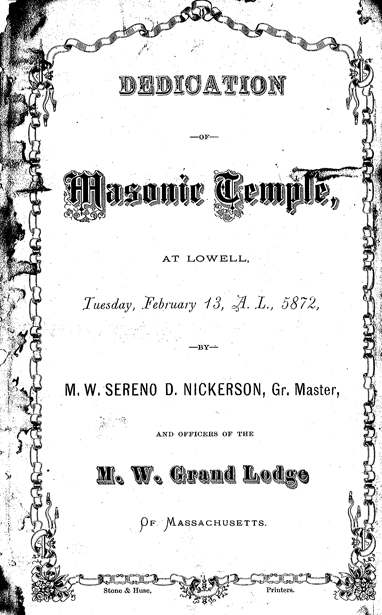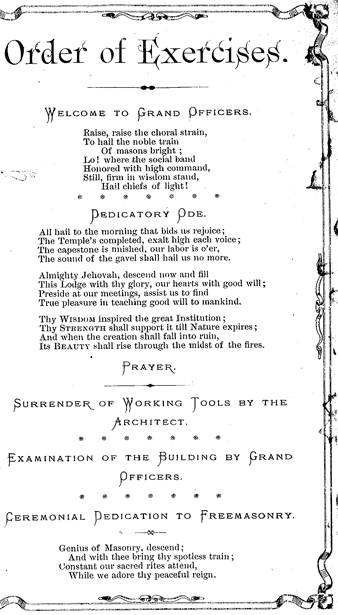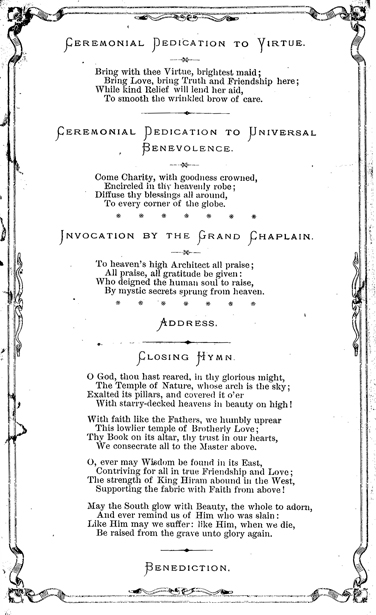MALowell
LOWELL
The city was incorporated in 1823, separated from Chelmsford.
LODGES
- Ancient York Lodge, from 1852 to the present.
- Kilwinning Lodge, from 1866 to its merger with William Sewall Gardner Lodge in 2007.
- Pentucket Lodge, from 1823 to the present; note that Lowell was not yet in existence when the lodge was chartered (it was in Chelmsford).
- William North Lodge, from 1867 to the present.
- William Sewall Gardner Lodge, from 1928 to its merger with Kilwinning Lodge in 2007.
- William Sewall Gardner-Kilwinning Lodge, from 2007 to the present.
BUILDINGS
- 06/12/1872: 1872-118; Hall dedication reported in the Grand Master's Address at the June Quarterly. (held 02/13/1872; see below).
- 01/28/1913: 1913-10; Hall dedication, at a Special Communication.
- 09/08/1928: 1928-179; Corner-stone laying, at a Special Communication.
- 10/08/1929: 1929-165; Hall dedication, at a Special Communication.
HALL DEDICATION, FEBRUARY 1872



Tuesday the 13th of February was a calendar day in the history of Masonry in Lowell. Perhaps no town or city in this commonwealth, outside of the city of Boston, contains a larger number of Masons, in proportion to its population, than this our enterprising and beautiful " City of Spindles," and certainly none stands out more conspicuously, or is more distinguished for its Masonic intelligence and fidelity to the Craft. Its present Masonic prosperity is therefore to be regarded as almost a matter of course, as well as of congratulation. The rapid growth of the Order and increase of members rendering the apartments heretofore occupied by the various Lodges and other bodies, insufficient for their accommodation, the erection of a new and more capacious hall was determined on; and this determination having been carried out, the day above named was set apart for its official Dedication by the Grand Lodge of the state; which body was represented by a larger delegation of its officers and permanent members than we have ever known on any similiar occasion; consisting of:
- M. W. Sereno D. Nickerson, G. M.
- R. W. Percival L. Everett, D. G. M.
- R. W. Charles Kimball, S. G. W.
- R. W. Tracy P. Cheever, J. G. W.
- R. W. Benj. Dean as Grand Treasurer.
- R. W. Charles W. Moore, C. G. Sec.
- R. W. and Rev. Chas. H. Titus, G. Sec. as G. Chaplain.
- W. Andrew J. Smith as S. G. D.
- W. R. Montgomery Field as J. G. D.
- W. W. H. Chessman, G. Mar.
- R. W. W. F. Grammer, D. D. G. M.
- R. W. Henry P. Perkins, D. D. G. M.
- R. W. Joel Spaulding, R. W. Wm. Sutton, and R. W. W. F. Salmon, P. G. Ws.
- R. W. Winslow Lewis, Wm. Parkman, John T. Heard, and William S. Gardner, P. G. M.
- Bro. F. A. Pierce, Grand Tyler.
On their arrival at the Depot in Lowell, the members of the Grand Lodge were received and conveyed in carriages to the Washingtoa House, where they diaed together at a sumptuous and well spread table. At the conclusion of this interesting part of the services of the day, they were escorted to the new Temple, which they found filled to its utmost capacity, by not less than 500 Brethren who had assembled to witness the ceremonies. The officers of the four Lowell Lodges were present, those of Pentucket, by right of seniority, occupying the chairs, viz.: W. M. A. B. Hall, S. W. Oliver Ober, J. W. Fred'k. Frye. The officers of the other lodges participating in the exercises were W. M. A. A. Haggett, S. W. N. C. Sanborn, J. W. of Ancient York Lodge; W. M. H. Hosford, S. W., S. W. Stevens, J. W., J. L. Pevey of Kilwinning Lodge; W. M. A. F. Wright, S. W. A. K. Lynch, J. W. W. E. Livingston of William North Lodge. The Lodges were opened by the officers of Pentucket Lodge. The invocation by the Chaplain, D. R. Wallace, was followed by singing, after which brief remarks were made by W. M. Hall, who then appointed a committee to escort the officers of the Grand Lodge into the hall, which body was welcomed by the choir as follows :—
Raise, raise the choral strain,
To hail the noble train
Of Masons bright;
Lo! where the social band
Honored with high command,
Still, firm in wisdom stand,
Hail chiefs of light!
and by the presiding Master of the united Lodges, in an exceedingly neat address, to which Grand Master Nickerson made an appropriate response, and the Grand Officers took their places. The usual ceremonies of Dedication followed, and being interspersed with music by an admirable choir, were effectively and impressively rendered. These being concluded, the officers of the Grand Lodge resumed their places, and Grand Master Nickerson briefly addressed the Brethren, congratulating them on the beauty and convenience of their new apartments, and their great prosperity. He reminded them that the hall had been dedicated to Freemasonry, and expressed the hope that it might never be used for any other purpose. He did not approve of public exhibitions in apartments set apart and dedicated to the sacred purposes of the Order. He thought such exhibitions did no good, while they rendered the formulas of the Institution unnecessarily popular and common. He earnestly protested against the frequent publications of Masonic elections and installations in our secular papers, and expressed the hope that a practice so offensive to good taste and the true spirit of Masonry, might be dispensed with. He also reminded the Brethren that the hall had been solemnly dedicated to Virtue, and expressed the hope that in the admission of candidates, the different Lodges that were to occupy it, would never be unmindful of the important lesson which that dedication teaches. It is not enough, he said, that the candidate is a "good fellow"; he should be good, upright and honorable in all respects, for in such members the strength and usefulness of the Institution lie. He next spoke of the dedication to Universal Benevolence and urged upon the Brethren as an important duty, the cultivation and practice of an enlarged Charity, saying he hoped that in a short time the Grand Lodge of the commonwealth would be in a condition to co-operate with them more liberally than it had recently been able to do, in giving vitality and efficiency to this over-topping purpose of our Institution. And in conclusion he introduced R. W. Bro. William S. Gardner, P. G. M. as the orator of the occasion.
We took no notes of Bro. Gardner's address, and as it will probably be soon published by the Lodge, it is perhaps as well that we did not. We shall be able to do better justice by it when it is before us in print. It was of course and able an interesting performance. The speaker sketched, with great minuteness of detail, the introduction and rise of the earliest Lodges in the District; referring in fitting terms to the many distinguished Brethren who were identified with them, and contributed to their respectability and prosperity. The first Lodge in Chelmsford, now Lowell, was Pentucket Lodge, organized under a Charier dated March 9, 1807. Starting from this point, the speaker graphically traced its progress up to the present time—indicating with great particularity, the different locations, rooms, halls and dwellings, in which, in its infancy, it was fostered and nurtured into maturity. This part of his address must have been particularly interesting to the Lowell brethren, as several of these ancient places of meeting are still in existence, and we think there were some aged Brethren present, who in early life were accustomed to practice their Masonry in them. The speaker also noticed in suitable terms the several Lodges and other Bodies in the city of more recent date, and in conclusion paid a just tribute of respect to the memory of distinguished Brethren, who having acceptably performed their labors here, have from time to time passed on to a higher sphere of duty. The Grand Lodge then retired and was duly closed.
In the evening a reception was given by the Brethren to the ladies, at which some 1200 persons were admitted by ticket. After viewing the premises and admiring the beauties of the apartments, the company were shown up to the banqueting hall, where tables were spread with such luxuries and dainties as the season afforded, and the genius and good taste of Bro. J. B. Smith, the distinguished caterer of this city, could suggest. Under the blaze of the brilliant gas-lights from the chandeliers, they presented an elegant and inviting appearance, and we do not doubt that ample justice was done to the many good things spread upon them, by the many gratified guests present.
We are indebted to the Vox Populi of Lowell, for the following description of the edifice.
"It is a handsome structure standing on Merrimac street, its iron and granite facing of pleasing proportions rising between the city numbers "64" and "74." There is nothing particularly striking in its aspect, being of no recognized style of architecture. Still its fine granite face marked with good architectural effect, with well-chiseled belts and a centre break, towering to a Mansard roof of good proportions surmounting the three stories, command the attention of the stranger.
It has been erected by ex-Mayor Hosford, and was commenced more than a year ago. It was the intention of finishing the third and fourth floors for Masonic purposes, and under the care of a committee representing the several Masonic bodies of Lowell, the work to the fitting and furnishing has been prosecuted.
The third floor is reached by a spacious staircase. The main hall occupies the whole of the front on Merrimac street, and is 49x38 feet, and clears 17 1-2 feet. This hall is lighted by six long windows, and the breaks made by these in the walls give character to a handsome fresco design. The furniture is of walnut, heavily carved, and upholstered in maroon terry; the carpet is a heavy English Brussels, and the ceiling most elaborately and uniquely frescoed, blends in colors with the elegance it canopies.
At the rear of the organ is a small ante-room, entered from the entry way. This contains black walnut cases for the wardrobe of each of the bodies. Opposite the hall is the armory of the Pilgrim Commandery, which in size is 29x17 feet. It has cases for 180 members. Certainly, it is in finish, convenience and richness of its furnishings one of the finest in the State. The cases are ornamented with silver trimmings; from the ceiling depends a beautiful chandelier, and this, with several bronze and metallic knights, were the graceful gifts of friends.
In the ell is a flight of stairs leading to the floor above, at the side of which is a passage-way leading to the ante-rooms. At the right of this passage is a small hall, entrance opposite that of the large hall. It is 30x20 feet, and in finish is a fitting associate to the apartments referred to. The fourth floor is in finish much more simple, but its arrangement is worthy of remark. It includes a banquet hall, which is 49x38 feet. This is over the larger hall of the third floor, and is supplied with all the portables and fixtures to which it is devoted. On the side opposite the landing on this floor, and comparing in size with the armory below, is a room where the cases from the old armory are set up, and the place otherwise made pleasant. At the extreme end of the ell is the modern kitchen, and this is in every way supplied with domestic tools used in that branch of masonry. On this floor are also ante-rooms used by Mount Horeb R. A. C., Pentucket, Ancient York, Kilwinning, and William North Lodges."
We have not room for a more particular description of the apartments than is given above, nor does this seem to be necessary, our contemporary having so well relieved us of the duty. We cannot however leave the subject without expressing the personal gratification we felt in passing through the various apartments; all of which, without an exception, are distinguished by good taste, harmony of design, and liberality of expenditure. The small hall referred to above, and which we understand will be used as the Prelate's room, is a perfect little gem. We don't believe it is equalled by any similar room in the commonwealth. The armory is another, and the larger or working hall is in harmony with them. The frescoing impressed us most favorably, particularly the figure over the Senior Warden's chair in the West. Ingeniously relieved as it is by a mechanical arrangement of the canopy, it presents a finish and boldness of relief seldom met with. But where everything is so well done, it is hardly worth while to discriminate in favor of any particular part.
We congratulate our Brethren of Lowell on the completion of their work, and the admirable manner in which it has been executed.